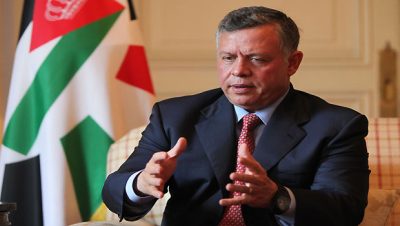By
Mahmoud Maharmeh
Jordan is a middle-income country that is seeking democratisation in the form of a parliamentary government. In his book ‘Essentials of Comparative Politics’, Patrick O’Neil defines liberal democracy as a political system that promotes “participation, competition and liberty.”
When observing the current parliament, one sees many problems such as underrepresentation. Why do these problems exist even after what was referred to as “a truly fair and transparent election”? In this article I explore the reasons behind these conditions. I examine what has been done on the ground in terms of democratisation in Jordan in recent years with a deep focus on King Abdullah’s five discussion papers. What do they suggest in order to reform the political system? Are those suggestions viable or are they just a mere idealisation?
In 2010 a young man by the name of Mohamed Bouazizi burned himself to death in Tunisia protesting the way the police treated him. Many young Tunisians followed him and started protesting against the government. This ignited the so-called Arab Spring movements. On January 14th the Tunisian president Zine el Abidine Ben Ali stepped down . While this uprising was fairly successful, fellow rebellions in Egypt, Libya, Syria and many more took a violent turn. Journalists are indifferent about the meaning of ‘Spring’ in the Arab Spring. Some said it obviously referred to the season while others referred to the object. The latter makes more sense as these movements feed into oppression. A pressured spring generates more impulse when it is released.
Jordan had its own share of the fiasco. The demonstrators had multiple demands. Liberals, conservatives, Islamists and leftists all turned to the king as the reformer.
King Abdullah decided to take a different approach in educating Jordanians about political reform. He published five discussion papers written in both Arabic and English. “The aim of these papers is to facilitate a national conversation around our reform roadmap and democratic transformation to build consensus, encourage citizens’ participation in decision-making and sustain the constructive momentum for reform.”
The first discussion paper was titled ‘Our Journey to Forge Our Path Towards Democracy’. King Abdullah uses this paper to share the necessary principles needed to bring about democratisation. This paper was published on December 29th 2012, and it explored the pre-elections necessities. Generally the Jordanian voter does not think at the ballot; they vote for a tribe member, a person they know, or a person who bribed them. However the voter has the responsibility, the right and the national duty to hold the candidates accountable and to keep them engaged in “discussions on key issues related to the economy, the country’s reform course and your vision for the future.”
The candidates are generally only engaged for the duration of elections. The king notices this problem and urges the people to engage with each other in political discussions. This is one step further into building a political culture. However in a country where this is slightly uncommon, the king believes that there should be some guiding principles to facilitate the discussion. While these principles might be taken for granted in developed countries, they are still to be engraved in the Jordanian society.
The first principle is “respect for all fellow citizens”. This is the foundation of free speech.
The Jordanian press experience so little freedom. Editors in chief do not respect writers’ opinions.
Different opinions are exactly what a country needs while maintaining the peacefulness of discussions.
The second principle is “citizenship and accountability go hand in hand”. This is one step towards good citizenship.
He outlines a few ways in which a citizen can be active. First he urges the citizens to vote in the elections while highlighting that democracy does not stop after voting, instead, “it is an on-going process; it is about holding our elected officials to their commitments.” These candidates come with their shiny slogans, and then they get away with doing nothing once they get the seat. It is the citizen’s role to ask these candidates to provide feasible plans to what they plan to do about what we the citizens bring to their attention. “Candidates must propose practical, objective and fact-based programs that provide implementable solutions to our challenges, rather than just theoretical slogans and over-diagnosis of our problems.” A good citizen is engaged in several practices such as writing letters to the editors of newspapers and their representatives in the parliament and engages in community groups to discuss concerns and feasible solutions to issues such as “playgrounds, traffic safety, rubbish collection, water and sewage networks, and maintenance of roads and infrastructure.”
The third guiding principle is “harnessing disagreement into compromise while maintaining dialogue.” When it comes to political dialogue, disagreement is a probability. It is important to maintain the discourse as peaceful and follow the assertion that a thesis needs an antithesis to form a synthesis. He highlights that discourse in general should happen around tables not through means of demonstrations. Demonstrations are nonetheless protected by the constitution; however, it should be a “last, not first resort”. Here one can sense the precautionary tone especially after what demonstrations brought to Egypt for example. The demonstrations in Egypt provide proof that demonstrations are the least peaceful way of expressing one’s opinion. They cause chaos, destruction, crimes, and de-development, parties eventually having to sit around tables to settle the differences.
The fourth principle is “shared gains and sacrifices.” In this section the king states that in democracy, things are always changing. There are no permanent conditions and no permanent answers. Then he outlines a set of practices necessary for any state that is on the verge of democratisation. First one has to have a sense of pride for the progress of the nation, then a sense of strength in overcoming the challenges. Third, one has to be involved in the making of the future through means of voting. Fourth, respectful discussions whether in in person or online. Fifth, respect amongst the citizens. After that, he urges the citizens to familiarise themselves more and further practice the rights guaranteed to them by the constitution.
The king raises the important question of how do we measure progress? He simply proposed that the right path is the one involving constant engagement in democratic practices. “We will know we are on the right path, because we will see ourselves getting better and better” at the five practices he listed above. I believe that another way to measure progress is through voting turnout, whether or not the level of clientelism decreases, and through the extent to which the people’s voices are heard. The king urges the citizens to engage in political discourse with the representatives and the newspapers, yet the parliament as a whole and the representatives individually shut their doors in the faces of the citizens. Let alone the fact that chief editors would not even publish anything radical. Thus, the intermediaries such as the parliamentarians and the chief editors are not well engaged in the discourse causing the network to be awkwardly interrupted.



what do you call where there is no real participation , compition ,and no liberty by practice -- yes they are there ,only by words ,and in media and t.v announcements only is not that a deception , mockery,and travesty- laughing at their people in the name of non existing democracy in the third world